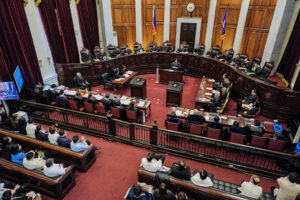Concluding the PhilHealth oral arguments

P90-billion fund transfer on Feb. 25, 2025. — PHILIPPINE STAR/JOHN RYAN BALDEMOR
Nine months after the first Supreme Court petition challenging the constitutionality of the PhilHealth (Philippine Health Insurance Corp.) fund transfer was filed, oral arguments on the petitions finally came to an end on April 3.
Petitioner groups led by Senator Koko Pimentel, the Makabayan bloc, 1SAMBAYAN Coalition, and the Federation of Free Workers (FFW) argued that Section 1(d) of the 2024 General Appropriations Act (GAA) and Department of Finance (DoF) Circular 2024-003 implementing the said provision directing PhilHealth to return P89.9 billion of its fund balance to the National Treasury violated the 1987 Constitution, the Universal Healthcare (UHC) Act of 2019, and the Sin Tax Reform Laws of 2012 and 2019 (RA 10351 and RA 11346).
Over the five oral argument hearings, the Court didn’t only tackle the legal and constitutional issues of the fund transfer, but also dwelled on the moral issues and the implications of the transfer on PhilHealth’s role as the country’s social health insurance provider and strategic purchaser of healthcare in implementing UHC.
From the very first hearing, Associate Justice Amy Lazaro-Javier went to the heart of the matter: Section 11 of the UHC Act, which clearly states that no portion of the PhilHealth reserve funds shall accrue to the general fund of the National Government, and that when the reserve fund hits its ceiling, the excess must be used to increase benefits or reduce the amount of members’ contributions.
Associate Justice Lazaro-Javier repeatedly noted that the UHC and Sin Tax Laws are clear: PhilHealth funds should be exclusively used for its programs and not for other purposes. She also noted that of the government projects funded by the PhilHealth fund transfer, some, like the Panay-Guimaras-Negros Island Bridges, were already fully funded.
For its part, the DoF, through Secretary Ralph Recto, defended its actions by arguing that the diverted PhilHealth funds that were used for infrastructure projects were still beneficial to health, given that patients badly need roads to access healthcare. The Department of Health (DoH) also noted that some of the diverted PhilHealth funds went to health programs like health facility enhancement.
But, as Associate Justice Lazaro-Javier noted, the Sin Tax Law is clear: tobacco and sweetened beverage excise taxes must go to PhilHealth (not the DoH, given that the DoH is responsible for population-based healthcare and PhilHealth is responsible for individual-based healthcare). Although 78% of the P60 billion that PhilHealth remitted to the National Treasury financed health projects, these have separate line items in the budget which should be funded by the DoH and not PhilHealth.
Secretary Recto argued that the PhilHealth fund transfer was what the country needed for fiscal responsibility. But as counsel for petitioners, Makabayan chair Neri Colmenares, argued, “Fiscal responsibility ends when it transgresses the Constitution.”
The government further justified the transfer of funds by arguing that tobacco and sweetened beverage excise tax revenues are only “soft earmarked” to PhilHealth — when sin taxes are collected, the funds form part of the general fund and do not go towards a special account in the general fund or an SAGF. Associate Justice Benjamin Caguioa contested this practice, saying: “If the sin tax laws already determine the source and use of funds to implement the UHC Act, even if the funds pass through the GAA, their character as earmarked for a special purpose remains intact… in order to preserve the special funds that are declared by law to be used only for a specific purpose, wouldn’t it be better to set them aside from the general fund? We should put guardrails so they are not used for a purpose other than the purpose they were levied for.”
Several Justices asked questions on the morality of the transfer, including Associate Justice Samuel Gaerlan, who asked questions his household help had asked him on the matter. Justice Gaerlan asked: Who does PhilHealth belong to? Why did the government take away members’ contributions? Is the country close enough to fully realizing universal healthcare to have “excess” funds to begin with?
The government, in its responses to Associate Justice Gaerlan’s questions, said that PhilHealth is hinged on social solidarity where the healthy pay for the healthcare of the poor and those with the ability to pay subsidize the healthcare of the poor. This very concept of risk sharing and resource pooling is what makes the fund transfer not only illegal, but immoral.
Petitioners highlighted that six years into UHC’s implementation, we are far from achieving the law’s aspirations as out-of-pocket spending remains high and provincial health system integration and health information systems, among others, remain a pipe dream. The immorality of the transfer was highlighted even further when Associate Justice Jhosep Lopez shared his own experience in 2022 when he was diagnosed with esophageal cancer and had to raise P7 million to pay for his surgery, only P50,000 of which was funded by PhilHealth.
PhilHealth said that it has ramped up benefit expansion in the past year, a feat that the DoH and DoF take pride in and chalk up to the pressure of the fund transfer. An improvement in efficiency, however, should not be celebrated if it came at the expense of forgone healthcare funds that could have saved the lives of the poorest of the poor.
Petitioners and respondents were asked to submit memoranda not more than a month after April 3. While we wait for the final decision of the Court, attention has to be brought to the 2025 budget, branded by advocates as “the most corrupt budget in Philippine history,” and the Supreme Court petition challenging the zero-budget given to PhilHealth in the 2025 GAA.
To quote Associate Justice Benjamin Caguioa’s closing statement during the oral arguments on April 2: “We have seen the many years, from 2003 all the way up to 2019, of discussions, staff work, interpellations, deliberations, extensive and thorough study — in order to come up with a Universal Health Care Act. A law that, in my view, has a particularly good design in establishing funding and sustainability. And all of that, all of it, gets undone by a one-sentence insertion in the 2024 GAA. Don’t you think there is something wrong [with] that?”
Pia Rodrigo is strategic communications officer at Action for Economic Reforms.




